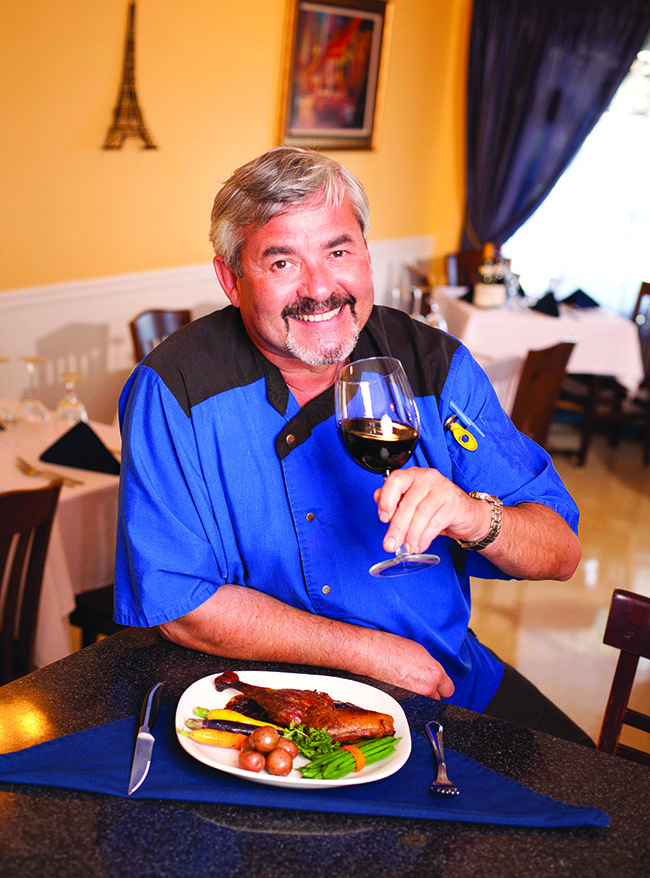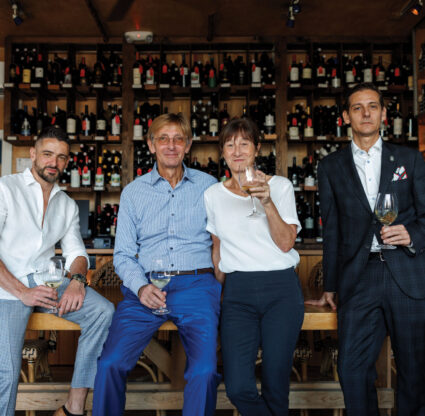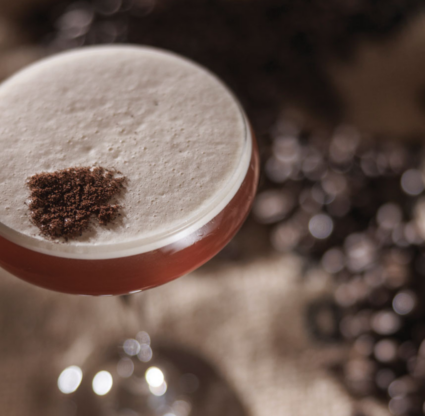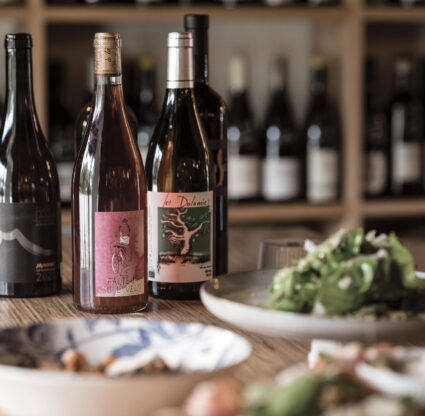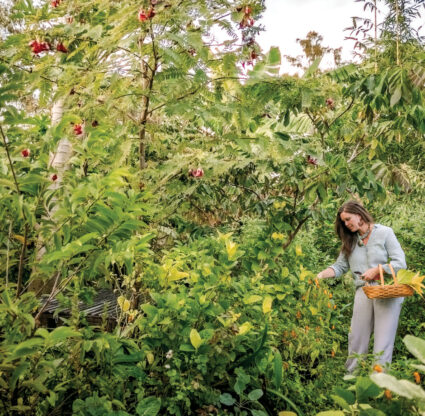We all love food. And most of us like to think we know what makes a good restaurant. (Perhaps that’s why so many open and close each year in Southwest Florida.)
As we’ve been surveying the dining scene this year, we’ve started to notice a lot of interesting ideas popping up. So we set out to find some people who maybe do have what it takes to have great success running their own eateries. What we found were three unique concepts, and three “chefs” who never really set out to be running restaurants at all.
CHRISTIAN VIVET
Chef/owner at Blue Windows French Bistro
15250 S. Tamiami Trail, Fort Myers mybluewindows.com
After Christian Vivet left his job working as a restaurant manager for WCI, he only had two rules for what his next step would be. “I didn’t want to open a restaurant,” he says. “And I didn’t want to cook French food.”
.jpg)
Five years later, Vivet is zero for two and couldn’t be happier. But his journey between looking for a new gig and being the chef/owner of Blue Windows French Bistro helped him create his perfect idea of how to run a restaurant.
After he left WCI, Vivet wanted to kind of get an idea of what the market would support. He knew he wanted to cook, but didn’t know how to build good word-of-mouth for his catering business. So he came up with the novel concept of a “pop-up restaurant.” Once a month he would send an email out to people inviting them to a one-night only, themed dining event. He would cook the food and pair it with wine—all for a pretty reasonable price.
After a few months he was turning people away. So he started out in the catering business with high hopes. He rented the spot that is now his restaurant to have a professional kitchen as well as storage and office space and a location to let people sample his food.
But when the economy tanked, so, too, went the corporate functions that kept him busy in between weddings. So he cleared out some space and started opening up as a restaurant a few nights a week. Customers had to call ahead for reservations and they had to double-check that the restaurant would be open.
Slowly, the restaurant pushed the catering business out of the way. “Now we sell out during season two days ahead,” Vivet says. “We’ve trained our customers to expect that.”
Sure, selling out isn’t so difficult when you only have 30 seats. But keeping the restaurant small (along with the kitchen staff that is just Vivet and a dishwasher), allows him to control the experience, making it as close to his pop-up concept as possible. He also limits the menu to only eight appetizers and 10 entrees.
“We want it to feel like your French friends invited you over for dinner,” he says. “The restaurant and my food aren’t frou-frou.”
EVA STRANAVSKY
Chef/co-owner at Apline Restaurant
2335 Vanderbilt Beach Road, Suite 158, Naples alpineofnaples.com
Chalk up another success story for both the immigrant experience and a mid-career change of path. Eva Stranavsky was a successful automation engineer in Slovakia working for manufacturing firms as well as owning her own food purveying business. But when she moved to the U.S. four years ago after marrying restaurateur Alex Stranavsky, she found herself in a kitchen instead. At first the couple tried running a coffee shop next to the movie theater in Bonita Springs. Despite huge passerby traffic, only 20-30 people a day actually stopped in for a cup. “I didn’t understand it,” Alex says. “Back home, going to the coffee shop is something you do before a movie. I thought it would be a great success.”

Call that lesson one in the couple’s American restaurant studies course. Step two was trying a coffee shop/crepery/gelato store off Collier Boulevard in the Pebblebrooke Plaza in Naples. Eventually, they realized more of a full-service restaurant was necessary to make things work. So Eva, inspired by the food of her youth, started making a goulash soup.
“It was a huge success,” Alex says. “So she started adding more dishes.”
Eva, who says she is “only learning” English, pulled from her memories of cooking with her grandmother and an engineer’s perfectionism to create what might be the most cohesive menu of Eastern European classics Naples has ever seen. The menu is small, because she “only makes what she thinks she does perfectly.” And everything is made from scratch. “She even makes the bread crumbs for the schnitzels, because it doesn’t have the right texture otherwise,” Alex says. The restaurant doesn’t even use a food purveyor, preferring to let Alex do the shopping that day to get the best and freshest ingredients possible for each night’s service.

Alpine engineering: Eva Stranavsky went from being an automation engineer in Slovakia to cooking worldclass schnitzel in Naples.
Really the only thing stopping Alpine from being a bigger success was the location, which is why the couple moved from Pebblebrooke (where it was known as Europia Bistro) to Vanderbilt Beach Road.
“The Czechs and Slovaks and Germans all love us,” Alex says. “They say ‘This tastes like my favorite from home.’ But they alone aren’t enough for us to make it. We need people from Naples and they weren’t willing to drive so far out.”
Call that lesson two—location, location, location.
JASON CHANG,
Founder/chef at Truly Organic Pizza
1016 Immokalee Road, Suite 204, Naples trulyorganicpizza.com
Jason Chang has been a lot of things—a stockbroker in New York, a commercial real estate agent and entrepreneur in China and a restaurant investor. But it was becoming a father that set him on the path to running what he hopes will be a fast-growing chain of certified-organic pizza parlors.

Organic Growth: Formerly an entrepeneur in China, Jason Chang started his pizza business as a way to get his kids to eat healthy food.
“We were living in Shanghai when we had our first child,” Chang says. “That’s not the environment (in which) we really wanted to raise a child.”
Chang had just sold a solar panel business, in which he was a major investor. He had the resources to take a new path in life, so he and his family returned to Naples, where they’d been vacationing for nearly 20 years.
“I wanted my kids to eat healthy, but I couldn’t get them to eat vegetables,” he says. “All they wanted was junk. So I thought, why not make the junk healthier?”
When he opened a bakery in Naples 18 years ago, Chang knew what he liked and hired people who could make that a reality. But this time he went in a different direction. He rented space in a warehouse and set up a test kitchen. And then he baked and baked and baked until he came up with a recipe that reminded him of the pizza he enjoyed as a kid growing up in Brooklyn, except this one is fully certified organic. So far he is the only pizzeria in the country with that designation.

It took some doing. He had to create a complex, computer-run water filtration system to recreate the water from the New York region in Florida. (“People in New York don’t realize how lucky they are with their water,” he says.) And he had to figure out a way to use the ovens big commercial pizza chains (Domino’s, Pizza Hut, etc.) use to make their pies.
“A wood-fired pizza is great, but it doesn’t last very long,” he says. “We want to deliver, so we need to work on the conveyor-style ovens.” But the end result is something he’s pretty proud of, so much so that he hopes to have five stores open in Southwest Florida fairly soon. He’s not sure if they’ll be stand-alone stores (like his Naples location) or more of a hybrid (like piggybacking off established restaurants)
“That’s the easy part for me,” Chang says referencing his business background. “Making the pizza was the hard part.”

